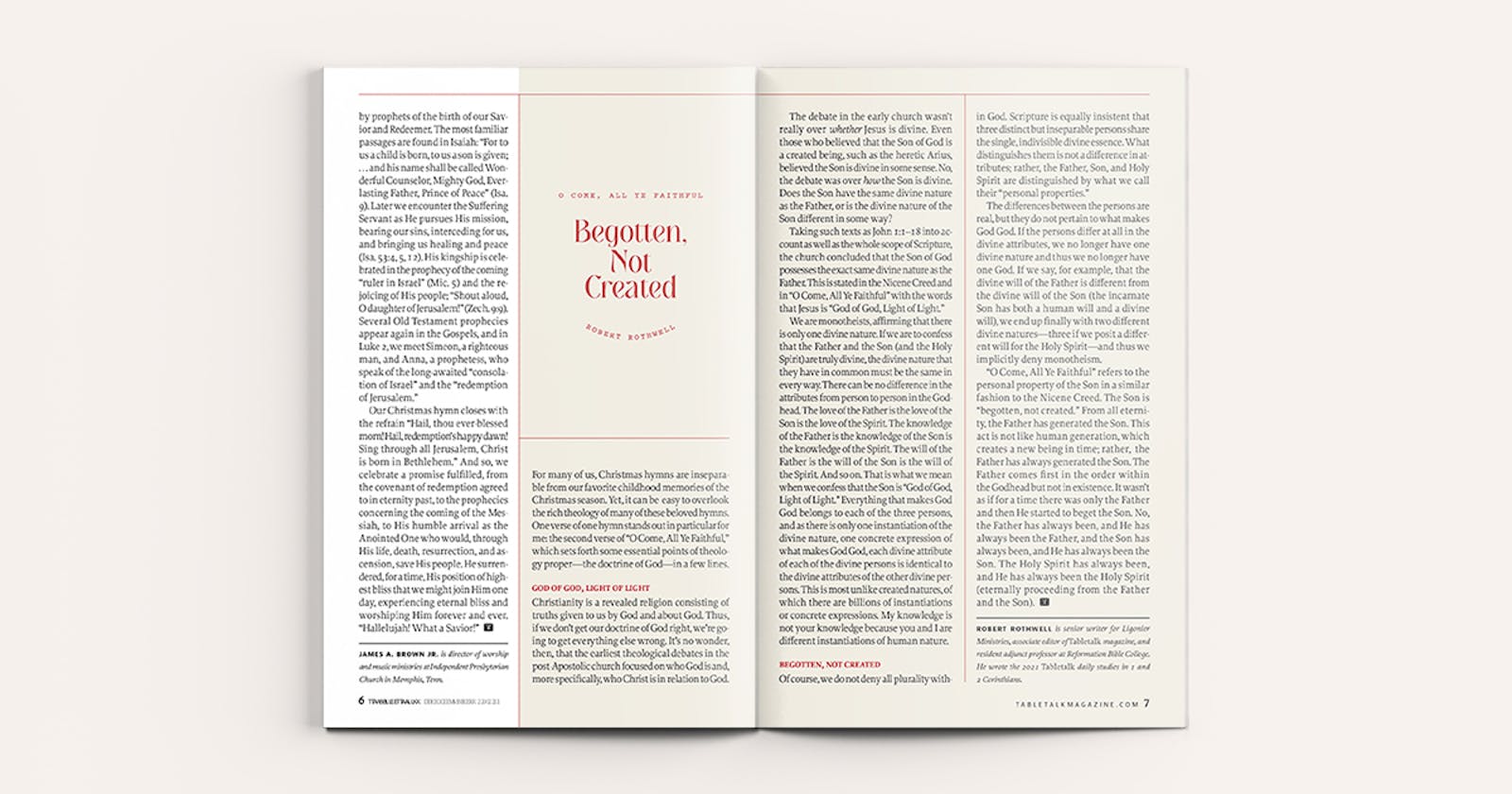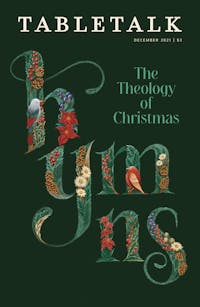
Request your free, three-month trial to Tabletalk magazine. You’ll receive the print issue monthly and gain immediate digital access to decades of archives. This trial is risk-free. No credit card required.
Try Tabletalk NowAlready receive Tabletalk magazine every month?
Verify your email address to gain unlimited access.
For many of us, Christmas hymns are inseparable from our favorite childhood memories of the Christmas season. Yet, it can be easy to overlook the rich theology of many of these beloved hymns. One verse of one hymn stands out in particular for me: the second verse of “O Come, All Ye Faithful,” which sets forth some essential points of theology proper—the doctrine of God—in a few lines.
god of god, light of light
Christianity is a revealed religion consisting of truths given to us by God and about God. Thus, if we don’t get our doctrine of God right, we’re going to get everything else wrong. It’s no wonder, then, that the earliest theological debates in the post-Apostolic church focused on who God is and, more specifically, who Christ is in relation to God.
The debate in the early church wasn’t really over whether Jesus is divine. Even those who believed that the Son of God is a created being, such as the heretic Arius, believed the Son is divine in some sense. No, the debate was over how the Son is divine. Does the Son have the same divine nature as the Father, or is the divine nature of the Son different in some way?
Taking such texts as John 1:1–18 into account as well as the whole scope of Scripture, the church concluded that the Son of God possesses the exact same divine nature as the Father. This is stated in the Nicene Creed and in “O Come, All Ye Faithful” with the words that Jesus is “God of God, Light of Light.”

We are monotheists, affirming that there is only one divine nature. If we are to confess that the Father and the Son (and the Holy Spirit) are truly divine, the divine nature that they have in common must be the same in every way. There can be no difference in the attributes from person to person in the Godhead. The love of the Father is the love of the Son is the love of the Spirit. The knowledge of the Father is the knowledge of the Son is the knowledge of the Spirit. The will of the Father is the will of the Son is the will of the Spirit. And so on. That is what we mean when we confess that the Son is “God of God, Light of Light.” Everything that makes God God belongs to each of the three persons, and as there is only one instantiation of the divine nature, one concrete expression of what makes God God, each divine attribute of each of the divine persons is identical to the divine attributes of the other divine persons. This is most unlike created natures, of which there are billions of instantiations or concrete expressions. My knowledge is not your knowledge because you and I are different instantiations of human nature.
begotten, not created
Of course, we do not deny all plurality within God. Scripture is equally insistent that three distinct but inseparable persons share the single, indivisible divine essence. What distinguishes them is not a difference in attributes; rather, the Father, Son, and Holy Spirit are distinguished by what we call their “personal properties.”
The differences between the persons are real, but they do not pertain to what makes God God. If the persons differ at all in the divine attributes, we no longer have one divine nature and thus we no longer have one God. If we say, for example, that the divine will of the Father is different from the divine will of the Son (the incarnate Son has both a human will and a divine will), we end up finally with two different divine natures—three if we posit a different will for the Holy Spirit—and thus we implicitly deny monotheism.
“O Come, All Ye Faithful” refers to the personal property of the Son in a similar fashion to the Nicene Creed. The Son is “begotten, not created.” From all eternity, the Father has generated the Son. This act is not like human generation, which creates a new being in time; rather, the Father has always generated the Son. The Father comes first in the order within the Godhead but not in existence. It wasn’t as if for a time there was only the Father and then He started to beget the Son. No, the Father has always been, and He has always been the Father, and the Son has always been, and He has always been the Son. The Holy Spirit has always been, and He has always been the Holy Spirit (eternally proceeding from the Father and the Son).
